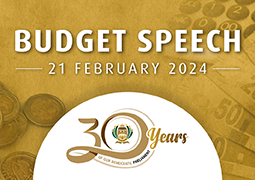
Much was expected from the National Treasury when the Minister of Finance delivered this year’s budget speech in Parliament last week. The nation was looking for a budget that achieved a balance between many competing needs in the face of a poorly performing economy, budget cuts, rising unemployment and expanding social welfare demands.
As is customary after the Budget Speech, a National Treasury team appeared before a joint meeting of the committees of Appropriations and Finance from the National Assembly and the National Council of Provinces to scrutinise the rationale of the Treasury’s budget allocations.
Two big ticket items continue to dog the fiscus: government expenditure and the country’s debt in relation to gross domestic product. If these are not managed and reduced, they pose a significant danger to the fiscus in the years to come, the Director-General of Treasury, Dr Duncan Pietersen, told the committee members in the meeting.
When the Treasury’s presentation was done, members posed a raft of questions seeking clarity on various issues, including the credibility of the 1,6% growth projections, how National Health Insurance (NHI) and other challenges in the Health and Social Development portfolios will be funded, the policy tradeoffs needed to balance the fiscus, and how the Budget seeks to balance competing priorities to rein in government debt and foster economic growth.
In response, the Minister of Finance, Mr Enoch Godongwana, mentioned that in a climate of slow economic growth and rising competing service delivery and social welfare needs, policy trade-offs are required. Without these, the fiscus will buckle under the pressure and the government will be forced to borrow and increase its debt margins.
On the topical issue of qualified doctors and social workers who are unemployed, he stated that the Department of Health will deal with that within its budgetary framework. On the NHI, the minister replied that it is difficult to state where the NHI budget will come from until NHI is legislated. “It’s only then that its funding model would be conceptualised concretely. Its current allocation is for upgrading its pilot projects,” Mr Godongwana stated.
As for where the 1,6% growth forecast will come from. The Commissioner of South African Revenue Services (SARS), Mr Ed Kieswetter, believes some revenue opportunities have not been fully exploited and could be unlocked by improved SARS administration efficiencies, along with improved intelligence and harvesting of the SARS debt book, among other things.
He stated that SARS debt book amounts to well over R300 billion. Recouping this debt has so far recovered R70 billion in revenue that was previously not accounted for. He further explained that there are other opportunities in our tax revenue landscape. He made an example that SARS’ intelligence operations prevented a financial outflow of R66 billion in this financial year that was not in the revenue forecast.
This, he pointed out, has been complemented by strengthening customs controls at ports of entry. He reported that customs has collected R5 billion and prevented a financial outflow of R7.5 billion. Mr Kieswetter emphasised that if administration employee efficiencies at customs were improved, more revenue could be accrued from our ports to alleviate the pressure of debt on the fiscus.
The Treasury’s Acting Deputy Director-General, Economic Policy, Ms Boipuso Modise, stated that the projected revenue growth forecast will be achieved if government continues to have a consolidated macro-economic framework aimed at reining in government debt and expenditure. In addition, structural adjustments in our network industries, which possesses many gains for economic growth, are required, along with a state that has the tools to use all the resources at its disposal, Ms Modise claimed. She assured the joint committees that the Treasury’s growth forecast is reliable and is based on best international estimates corroborated by both internal and external experts.
Abel Mputing
26 February 2024

